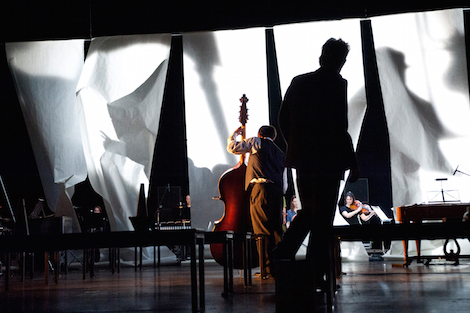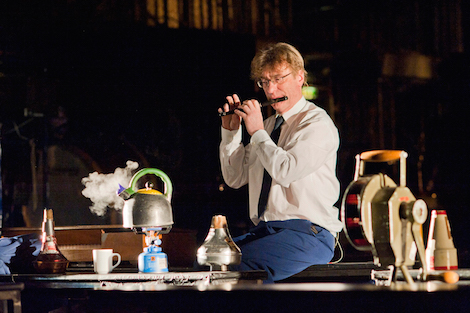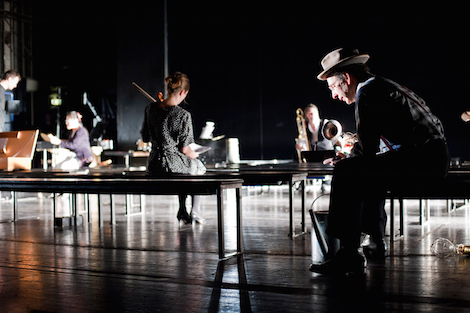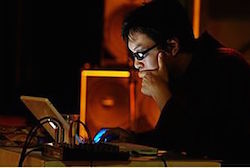Heiner Goebbels: Black on White
by Otani Yoshio

Heiner Goebbels / Ensemble Modern – Black On White –
© Christian Schafferer
Otani Yoshio
I saw Heiner Goebbels when Cassiber toured to Japan for the first, and last, time. Checking now, I see that it was in 1992—already 25 years ago! Formed by Goebbels with Chris Cutler, Christoph Anders, and Alfred Harth (who at the time of the tour had yet to leave the group), Cassiber was a major European avant-rock band in which each musician played various instruments, bringing on stage a mix of sounds until then never assembled together, including folk, electronic music, rock, disco, recorded sounds, and theater, which were then fused into a speed-punk collage style whose modern aesthetics had an epoch-making impact on the improvisation scene that was at that time still dominant.

Heiner Goebbels / Ensemble Modern – Black On White –
© Christian Schafferer
Although the group directly influenced musicians more from the generation before mine, Cassiber, along with the Fred Frith documentary Step Across the Border that was released in the early 1990s, gave me many ideas about what improvisational performance can do just at the time when I had started to make music.
Frith and Cassiber differ in how the former employed vibrant methodologies of creating music as a border-crossing individual while the latter explored the potential of incorporating an entire world within a closely aligned organization. Moreover, when Cassiber toured to Japan, the late Masami Shinoda of the band Compostela played with them, encompassing yet another kind of music. Songs, abstraction, rhythm showcase, free jazz, noise, pop, hardcore… These fertile fields were my ur-landscape in the 1990s.
Some 20 years have passed. It might well be that the most inaccessible music now is from that period, the music from the 1980s and 1990s that utterly reflected the magic word of “postmodern.” At that time, rigorous divisions of nation, ethnicity and race still existed even within music. Looking back now from the situation like we have today where popular music has completely liquefied as a digital consumable, that time clearly was a kind of transition period. When we listen to the various experiments attempted then with the ears of the present day, what do they sound like? The experimental music of the 1980s and 1990s, when the walls of reality rose up everywhere, encapsulates a theory of organization for linking the things to come together. Today, as we surely head toward the next period of transition, listening to the ideas supporting this music provides us with major clues for confronting the present. “Don’t feel, think!” as Sho Ayanokoji said.

Heiner Goebbels / Ensemble Modern – Black On White –
© Christian Schafferer
After Cassiber broke up, Heiner Goebbels entered even more ambitious territory, that of dealing with the entirety of the art of Western Europe. Black on White was premiered in 1996. It was a performance that truly created the age when the “present” started. In the intervening 20 years, what has been born and what has disappeared? What is the “absence” that was summoned on stage? Just like with Cassiber’s Japan tour, the first staging in Japan of Black on White will surely engender new ideas and organization theories.
(Publication of the English version: October 20, 2017)
Otani Yoshio
As a critic, Yoshio Otani is the author of numerous books. As a musician, he performs widely across many styles and genres, including jazz, hip hop, and stage music.

Heiner Goebbels / Ensemble Modern – Black On White –
Oct.27 [Fri],2017 -Oct.28 [Sat],2017 / Kyoto Art Theater Shunjuza
Visit the website for more information:
Kyoto Art Theater Shunjuza
KYOTO EXPERIMENT 2017